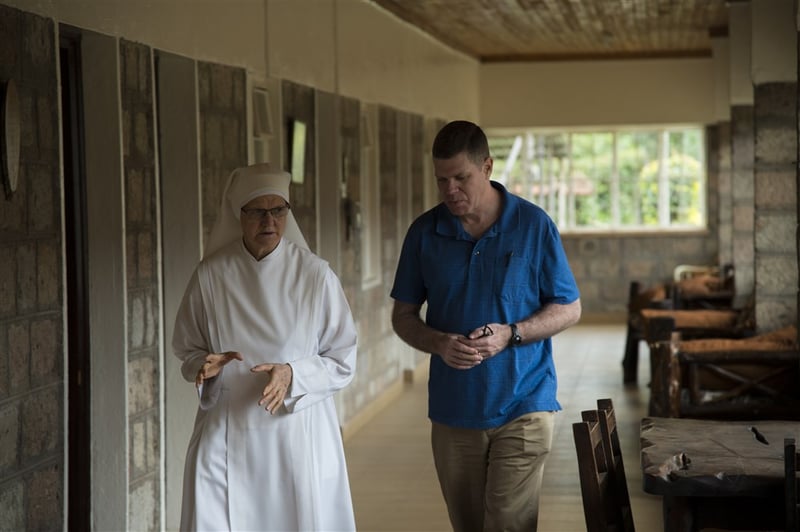
(Nun and Chaplain walking and talking)
I was making rounds on the patient care unit at the hospital where I was newly employed as a chaplain. It was a transition time, from a chaplaincy model that was mostly reactive to one that took a more proactive approach to spiritual care. In the past the focus had been on responding to the pager -- requests for pre-surgery, emergency, and end-of-life situations – and consisted of prayers, rituals and blessings.
My goal was to take the initiative and go onto the nurses’ stations without any agenda other than to introduce myself and offer support to the staff, patients and visitors. My opening line when I met someone new usually went something like this:
“Hello, I’m the chaplain. I’m making rounds on the unit today and came by to introduce myself and offer my support.”
The responses tended to be variations on one of these:
- What’s a chaplain?
- Oh no! What do you know that I don’t know, and who sent you?!?
- I’m not religious.
- What church are you from?
- Thanks, but I’m doing OK, I’m sure someone else needs you more than I do.
- I’m so glad you’re here! My minister was here an hour ago but you can’t have too many prayers.
- Hello, nice to meet you chaplain.
Over time, I figured out ways to engage with people regardless of their initial response. Establishing a relationship was the real challenge. Over the course of 20+ years I also discovered that those various responses didn’t change much. People start from where they are. In an increasingly secular society, many don’t know what a chaplain is. Others have some basis for knowing (or thinking they know) what chaplains do, and respond with fear, anger, curiosity, warmth. In any chaplaincy context, establishing a relationship is the starting place.
Contexts for Ministry
The role of chaplain has a symbolic value. The emotional responses in the list above tell us that we represent something bigger than our individual selves. To the care receiver, we may be: Chaplain as bearer of bad news. Chaplain as representative of a particular faith tradition, hoping to recruit a few new members. Chaplain as miracle worker, here to kiss the hurt and make it all better.
We may not think of ourselves in any of those ways, but we never know who the care receiver sees when we walk through the door. In any context, though, the chaplain is one who walks with, one who accompanies, one who journeys alongside and lightens the load. Chaplaincy becomes an identity. More important than what I do or where I work, a chaplain is who I am.
One can be a chaplain in many different places, interacting with different populations. A short list:
- Hospital chaplain
- Prison chaplain
- Long-term care center chaplain
- School or university chaplain
- Hospice chaplain
- Military chaplain
- Pediatric hospital chaplain
- Law enforcement, fire, EMS chaplain
- Workplace chaplain
- Trauma center chaplain
- Summer camp chaplain
- Bereavement or funeral home chaplain
- Homeless shelter chaplain
Chaplains travel lightly. We don’t need a lot of “stuff” to do what we do. The tools we use are compassion, care, self-awareness, insight, perspective, respect.
Grounded in Tradition, Open to the World
The chaplain lives in a both/and world. The chaplain is grounded in a tradition and at the same time open to the world. We know who we are, and we have a spiritual home. The chaplain is part of a community that shares beliefs and practices. Our practice of chaplaincy has its foundations there. And out of that grounding, we encounter the world, in all its infinite varieties of religious expression, all of its fears and questions, all of its joys and celebrations.
We are challenged to articulate our theological foundations for chaplaincy. Those who come into our care have a right to know who we are, where we are grounded, and what they can expect of us. Transparency is critical. You may not talk about your theology, but it will show. Thus the need to be intentional about why we are chaplains and how we think about interreligious chaplaincy.
The Cost of Caring
Chaplains support people at critical times in their lives. In some settings, we have the opportunity to build relationships, so we aren’t strangers when crises happen. In other chaplaincy venues we meet people for the first time in the middle of a crisis.
A colleague observed, “Another day at work for us is the worst day of someone else’s life.” People observe us and mistakenly assume that critical times in peoples’ lives don’t bother us. Chaplains carry a lot of emotional weight. Yet even though we grow into our professions and are good at what we do, this work does not get easier. It only gets more familiar. Why is that? There’s an obvious clue.
It’s right there in the word compassion. We do have compassion for those who come under our care. The word “compassion” comes from the Latin, “to suffer with.” When we are our authentic selves, on a deep inner level we cannot do anything except care. Yet the cost of caring is that we put ourselves at risk for burnout and compassion fatigue. Self-care and the support of others are vital. We need to be deliberate in identifying family, friends, professional colleagues, faith community, mental health professionals, and other people with whom we can talk, laugh and cry about things that matter.
One of the benefits of chaplaincy that many have realized is an expansion of our sense of gratitude for the ordinary. In contrast to the dark and heavy situations in which chaplains sometimes find themselves, a day with no major problems is a very good day. Our perspective toward life and toward the world is shaped by the context in which we live. Chaplaincy changes us. For the better.
It is hard work, but we wouldn’t have it any other way.



Your Comments :